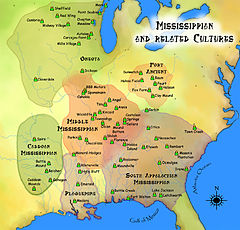- Nacogdoche
-
Nacogdoche 
Sabine River, Texas Total population assimilated into Caddo Nation Regions with significant populations  United States
United States
( Oklahoma, formerly
Oklahoma, formerly  Texas)
Texas)Languages Hasinai, English
Religion traditional tribal religion
Related ethnic groups other Hasinai tribes: Hainai, Nabedache, Nabiti, Nacono, Nadaco, Nasoni, Nechaui, Neche
The Nacogdoche are a Native American tribe from eastern Texas.[1]
Contents
History
The Nacogdoche were part of the Hasinai branch of the Caddo Confederacy[1] and closely allied with the Lower Nasoni. They historically lived between the Angelina and the Sabine Rivers in Texas. The Gentleman of Elvas, a member of Hernando de Soto's 1541 expedition, wrote about the tribe, as did Francisco de Jesus Maria in 1691.[2]
In 1716, Francisco monks accompanying Spanish explorer Domingo Ramón founded the Nuestra Señora de Guadalupe de los Nacogdoches Mission to serve the Nacogdoche as well as neighboring tribes.[3] In 1750, a Nacogdoche chief, Chacaiauchia, threatened to kill the presiding father at the mission, Father Calahorray Sanz, and demanded that all other Spaniards leave Nacogdoches territory.[2] This threat was not fulfilled. The mission remained until in 1773,[4] with brief dormant periods due to fear of French attack.[5]
The governor of Texas visited the Nacogdoche in 1752.[2] Their primary village, Nevantin, was located near present day Nacogdoches, Texas,[5] named for the tribe. Four mounds surrounded the site of Nevantin, until research times.[2]
While Spanish colonizers claimed Nacogdoche land, the tribe traded freely with the French. French traders provided firearms, ammunition, metal-bladed knives, cloth, vermilion dye, and other sundries in exchange for horses, prepared animal hides, bear's fat, beans, corn, and Apache slaves.[2]
By 1800, European diseases and warfare had greatly reduced the population of the tribe. The survivors joined other Hasinai tribes.[3]
Ultimately, they were forced to relocate to the Wichita Reservation in Indian Territory in the 19th century.[3] Today they are enrolled in the Caddo Nation of Oklahoma.
Synonymy
The tribe is also known as the Nazadachotzi,[2] Nacadocheeto, Nacodissy, Nacodochito, Nagodoche, Nasahossoz, Naugdoche, Nocodosh,[3] and Neticatzi.[6]
Notes
References
- Bolton, Herbet E. The Hasinais: Southern Caddoans As Seen by the Earliest Europeans. Norman: University of Oklahoma Press, 2002. ISBN 978-0806134413.
- Sturtevant, William C., general editor and Raymond D. Fogelson, volume editor. Handbook of North American Indians: Southeast. Volume 14. Washington DC: Smithsonian Institution, 2004. ISBN 0-16-072300-0.
External links
- Nacogdoche Indians, from Handbook of Texas Online
- Nacogdoche Indian Tribe History, from Access Genealogy
Caddo Confederacy Hasinai Kadohadacho Natchitoches Other groups  Pre-Columbian North America
Pre-Columbian North AmericaArchaeological cultures North American pre-Columbian chronology – Adena – Alachua – Ancient Pueblo (Anasazi) – Baytown – Belle Glade – Buttermilk Creek Complex – Caborn-Welborn – Calf Creek – Caloosahatchee – Clovis – Coles Creek – Deptford – Folsom – Fort Ancient – Fort Walton – Fremont – Glades – Glacial Kame – Hopewell (List of Hopewell sites) – Hohokam – Leon-Jefferson – Mississippian (List of Mississippian sites) – Mogollon – Monongahela – Old Cordilleran – Oneota – Paleo-Arctic – Paleo-Indians – Patayan – Plano – Plaquemine – Poverty Point – Prehistoric Southwest – Red Ocher – Santa Rosa-Swift Creek – St. Johns – Steed-Kisker – Tchefuncte – Tocobaga – Troyville
Archaeological sites Angel Mounds – Bandelier National Monument – The Bluff Point Stoneworks – Cahokia – Chaco Canyon – Casa Grande – Coso Rock Art District – Eaker – Effigy Mounds National Monument – Etowah Indian Mounds – Eva – Folsom Site – Fort Ancient – Fort Center – Gila Cliff Dwellings National Monument – Holly Bluff Site – Hopewell Culture National Historical Park – Kincaid Mounds – Kolomoki – Manitou Cliff Dwellings – Marksville – Meadowcroft Rockshelter – Mesa Verde – Moorehead Circle – Moundville – Mummy Cave – Nodena Site – Ocmulgee National Monument – Old Stone Fort – Parkin Park – Pinson Mounds – Portsmouth Earthworks – Poverty Point – Pueblo Bonito – Rock Eagle – Rock Hawk – Salmon Ruins – Serpent Mound – Spiro Mounds – SunWatch – Taos Pueblo – Toltec Mounds – Town Creek Indian Mound – WintervilleMiscellaneous Ballgame – Black drink – Buhl woman – Calumet – Chunkey – Clovis point – Container Revolution – Eastern Agricultural Complex – Eden point – Effigy mound – Falcon dancer – Folsom point – Green Corn Ceremony – Horned Serpent – Kennewick man – Kiva – Metallurgy – Mi'kmaq hieroglyphic writing – Medicine wheel – Mound builders – N.A.G.P.R.A. – Norse colonization of the Americas – Piasa – Pueblo dwellings – Southeastern Ceremonial Complex – Three Sisters agriculture – Thunderbird – Underwater panther
Categories:- Caddoan peoples
- Native American history of Texas
- Native American tribes in Oklahoma
- Native American tribes in Texas
Wikimedia Foundation. 2010.


